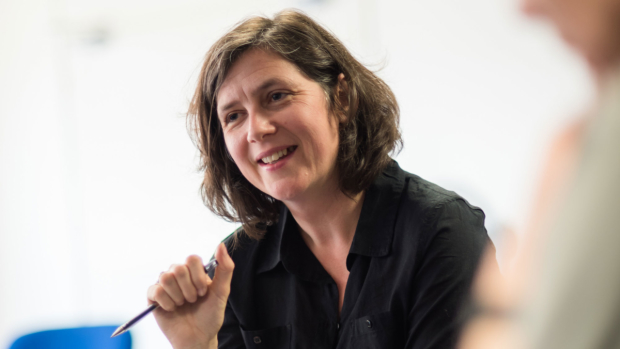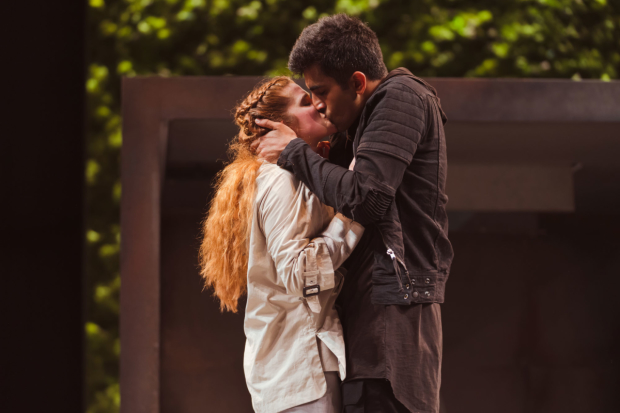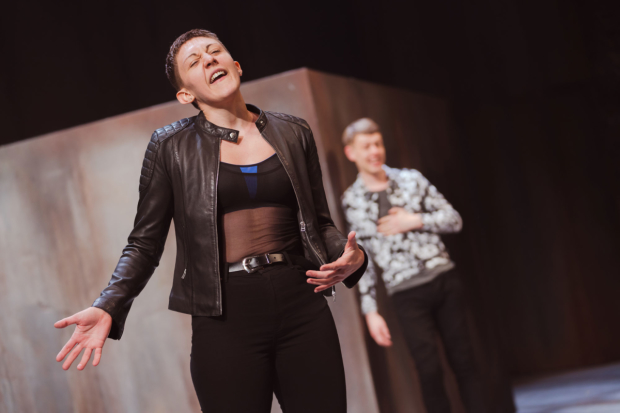Erica Whyman: 'A hierarchy about how people sound is divisive'
The RSC’s deputy artistic director Erica Whyman talks accents, reaching young people and her remarkable new Romeo and Juliet

© Topher McGrillis
Some might say deputy artistic director of the RSC Erica Whyman is a glutton for punishment. In 2016, she staged an astonishingly ambitious production of Shakespeare's A Midsummer Night's Dream, subtitled A Play For the Nation, which she toured up and down the UK with local amateur actors joining a professional cast in each area. Now she has embarked upon a Romeo and Juliet which welcomes two groups of four young people from the local area of each venue to share the role of the chorus with the professional cast. Stopping off in cities such as Norwich, Newcastle, Nottingham and Blackpool, Whyman's staging is a modern-day look at Shakespeare's tragic tale of love. Here she explains why she's decided to direct such an epic project.
Why did you choose Romeo and Juliet for this specific project?
I started thinking about this play when I was finishing A Midsummer Night's Dream. And 2016 was a funny year, wasn't it? A referendum in the middle of it and I had also directed a play by Anders Lustgarten called Seven Acts of Mercy about poverty and this country and inequality, and Caravaggio. And I was in rehearsals when Trump was elected. So when I picked this play up I had a strong sense of the state of the nation and the complexities of that and what diversity in this country really means. I think if diversity, in its truest sense of the word, is not respected or understood then people start to feel disaffected and their desire to revolt is much greater and more dangerous.
And you thought Romeo and Juliet could speak to that?
I opened the play and tried to think: 'What would you see in this play if you hadn't seen it before?' And instantly I saw that the play is full of courage. Romeo and Juliet are incredibly brave, they take action that challenges the grown-ups all around them. I started to think about the way young people across the world are underestimated and the debate around voting age and began to ask: 'If you can't vote, how do we hear those voices?' But in the middle of all of that, the play is also a love story. You can make hard-hitting drama about what's wrong in our world but you have to have a humanity too otherwise people aren't moved by it. It's a brilliant play, it felt like directing a new play.

Topher McGrillis © RSC
It's set in the modern day, what have been the challenges with that?
This is actually my first completely modern dress Shakespeare. I've usually found a world that bridges theirs and ours – Dream was set in the '40s, for example. Here it's as close to our world as it can get. In our world they haven't invented telecommunications, because it just doesn't work. You have to send letters. They've eradicated guns, but they do have the capacity to play music on tiny devices and they do have post punk music and grime. The knives relate to the knives we see on our streets.
So presumably the Capulets and Montagues fit into the idea of modern-day gangs?
Shakespeare doesn't solve who the Capulets or the Montagues are, he's not interested in what the grudge is about. There are productions which have successfully solved that by saying one group is a particular race or culture or religion or opinion. I haven't done that, my world is very mixed up. It's complicated to see who's Capulet and who's Montague. That's because it's like the world I see in the cities in our country, including London. You can't tell who belongs to which gang or allegiance or political party.
It's on a very big tour, was choosing to tour it an integral part of the project?
Completely. I've been touring theatre around the country for 30-odd years and it really matters. I'm a convert to the live theatre broadcasts but it isn't the same as bringing a whole show to a city. We have an amazing set of associate schools and theatres who work with us to engage children and young people. And the cast do represent the nation. Some of that was conscious and unconscious. We have actors from Hull, Liverpool, Glasgow and Coventry. They don't speak with a central voice, because in the places we will tour to, there isn't a single voice.
It's interesting to think that RP was the sacred accent for such a long time…
I had my accent kicked out of me, I was born in Barnsley and it's left me with a keen sense that all the voices are equal and a hierarchy about how people sound is really unhelpful and divisive. Bally Gill plays Romeo and is from Coventry, he's got a very light accent, but I think he gets closest to how Shakespeare might sound playing Romeo, as he was born in Warwickshire. And the rich tones in some of my cast members are wonderfully musical. They are sometimes much more able to find a drive in the verse line, because with RP we swallow our words.
You have a partly amateur cast in Romeo and Juliet, which you also did with Dream: why do it again?
I'm addicted. It was different on Dream because we had some very young children taking on the final passages of the play, this one they are older young people. But it means the world to them. What happened on Dream really changed me.
Presumably the young cast think it's the most fun thing they've ever done?
They are enjoying it, but what's interesting is what they say is deadly serious. They want to engage with the issues. They think this is an opportunity to ensure their voices are onstage, and they all have a particular version of that. Some are anxious and troubled by knife crime and violence, and some say: 'My dad doesn't listen to me'. They are taking the opportunity to be representative of their generation.

Topher McGrillis © RSC
You have Charlotte Josephine playing Mercutio, is she playing the character as a woman?
Yes, she's a woman, she's not pretending to be a man. She's a woman who is very conscious of her gender and challenges other people to be more honest about that. Charlotte is an amazing human being, she has really honoured Mercutio.
Do you think gender fluidity is the way to try to get more balanced casts when it comes to Shakespeare?
I think the language around this is really important, so gender balance is the phrase that we use as a team. That leaves open a whole raft of ways of approaching that. I prefer to look at ways of having women in the plays as opposed to women in the casts. So we have the Prince played as a woman. For me, it's about saying our world has women in it and those women are different to one another. I've had conversations where someone says: 'Well if you have a strong woman in a play and another woman who doesn't have agency, surely the whole notion of the world will collapse?'. But in my world there are loads of women who don't have agency and loads who do. I am keen on diversity of women.



















